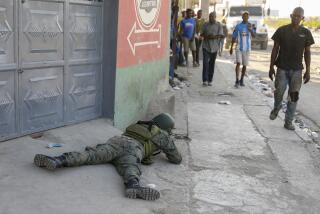U.S. Still Backs Aristide Return, Christopher Says
- Share via
WASHINGTON — Secretary of State Warren Christopher denied Friday that the United States and its allies have abandoned their attempt to restore ousted President Jean-Bertrand Aristide to power in Haiti, but he acknowledged that efforts so far have proven ineffective and may have to be completely redirected.
“It certainly is not going to be easy,” Christopher said. “The (Haitian) military has shown itself to be a formidable obstacle and rather wily, with a high degree of self-preservation.”
He said that Washington must find a way to “re-energize and reactivate” its effort to restore democracy to the impoverished Caribbean nation. But he gave no indication that any new programs are being developed.
A Times report Thursday cited diplomats and other sources in Port-au-Prince who asserted that the United States had given up on Aristide. In a briefing with reporters Friday, Christopher called the report “quite inaccurate.”
White House spokeswoman Dee Dee Myers on Friday also rejected the report, saying the United States is still trying to restore Aristide to power, even though he was supposed to have returned by Oct. 30.
“The process is not dead,” Myers told reporters. “I think we’re disappointed in the pace of progress, but the process is by no means dead.”
But Christopher, in an interview on Friday, did not quarrel with the sources in Haiti who told The Times that Washington’s preferred strategy for restoring democracy seems to have failed.
The secretary acknowledged that the United States had pinned its hopes on efforts by Robert Malval, Aristide’s prime minister, to reconcile the military and its affluent civilian backers with Aristide and the country’s impoverished majority, which forms his power base.
Malval announced his resignation this week after his plan for a national peace conference--backed by the United States and the United Nations--failed in the face of opposition from both Aristide and the military.
“We found in Prime Minister Malval an unusually effective person,” Christopher said. “We hope that either he or someone like him can be involved, because he was able to bridge some gaps. If he is gone from the scene, it certainly will require some new thinking on our part.”
At the same time, Christopher rejected suggestions that the international community might seek a compromise to restore a civilian government, perhaps led by Malval, that would exclude Aristide, who is hated and feared by the military and its civilian supporters. Aristide’s detractors argue that the ousted president himself is a major obstacle to restoration of democracy.
“Aristide is the duly elected president of the country,” Christopher said. “Few people doubt that he would be elected again if there would be another election. He continues to be a major factor in the policy. There is nobody else who was elected president.”
Although Aristide named Malval as prime minister, relations between the two men are now so strained that it seems unlikely Malval ever again could play the role of mediator that the U.S. government would like to assign to him.
The Clinton Administration clearly does not want to appear to be abandoning Haitian democracy.
In addition to the foreign policy implications, Haiti has an impact on U.S. domestic policy in at least two ways. First, if Haiti’s impoverished masses lose hope that Aristide eventually will regain power, they almost certainly will renew efforts to reach the United States by boat. Second, Haiti has become a significant test of the Administration’s relations with the American black community, a key part of President Clinton’s political base.
So far, black leaders have given Clinton the benefit of the doubt on the issue, crediting the President with a good-faith effort on Aristide’s behalf. If it writes off Aristide, however, the Administration could experience a backlash from the black community.
With Malval’s conference plan at a dead end, the Administration is counting on an economic embargo to force Lt. Gen. Raoul Cedras, Haiti’s army chief of staff, to permit Aristide to regain power. A State Department official said that the island nation is expected to run out of gasoline and other fuels sometime next month, after which the military might have to agree to negotiate a solution permitting Aristide to return in exchange for lifting the sanctions.
Cedras, apparently driven by earlier sanctions, signed an agreement with Aristide last July, following talks on Governors Island in New York harbor, that spelled out terms for Aristide’s restoration. The United Nations relaxed the sanctions because Cedras had signed the pact, but the army chief reneged on the agreement.
Christopher said that the sanctions will remain in effect this time until all of the conditions of the Governors Island agreement have been met and democracy is restored.
“You learn from your experiences and try to avoid repeating them,” he said.
Aristide, operating from his headquarters in exile in a Georgetown apartment complex, supports the sanctions approach. But a source close to the ousted president said that the key question is whether the Administration will stick to its policy long enough for it to accomplish its objective.
“What we hope is that the impact of the sanctions will be felt and the U.N. will be firm and will not begin to find compromises that will give the military a way out,” the Aristide supporter said. “Governors Island (agreement) was a compromise. How much can you compromise a compromise?”
The source said that Aristide believes Clinton is sincere in his support for Haitian democracy but that the Administration is sending “mixed signals” that have emboldened the military.
More to Read
Get the L.A. Times Politics newsletter
Deeply reported insights into legislation, politics and policy from Sacramento, Washington and beyond. In your inbox twice per week.
You may occasionally receive promotional content from the Los Angeles Times.










